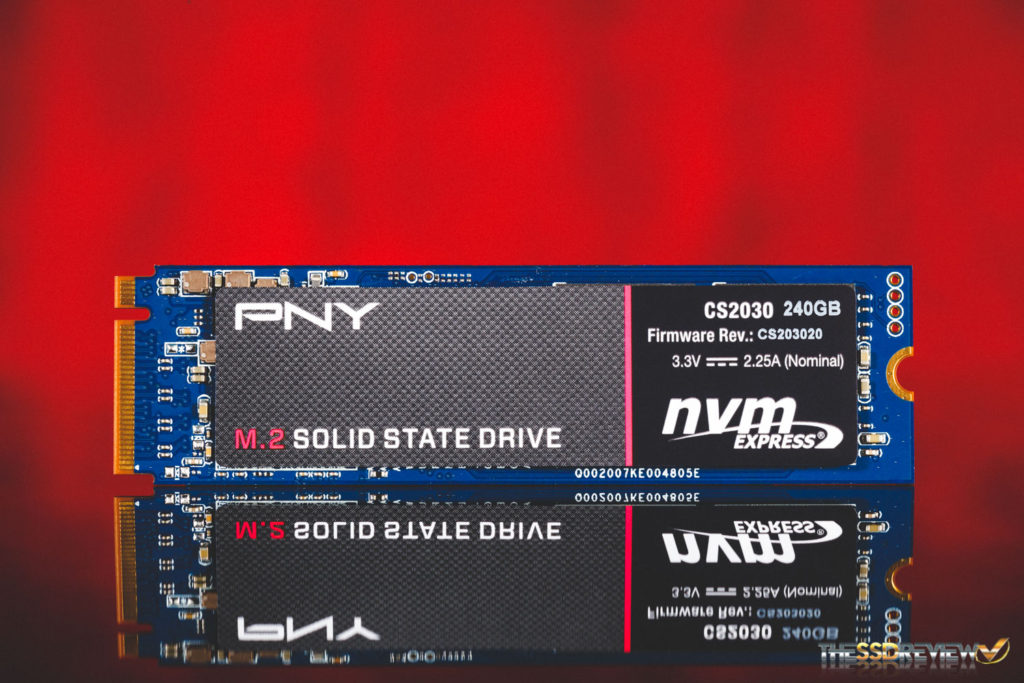The PNY CS2030 M.2 NVMe SSD comes out of the blue for us. The day it was released, we were more surprised than anyone. Not a whisper in the world about it had crossed our ears like it normally would. Not even our colleagues knew about it. With reading about its high-performance specifications on retail websites and seeing potential customers ask about it in forums so quickly, we just knew we had to get it in our hands as soon as possible.
Today, we finally have it. Not only is it PNY’s first PCIe SSD, but over a year after its initial release, we also get our first look at an SSD powered by a Phison E7 controller. This robust NVMe controller offers manufacturers high performance and plenty of flash management features to keep your data safe and secure. It is no wonder that there are now a few different products out there with this controller at their core. This being our first look, however, we must be a bit cautious with making any statements on how it well it may or may not perform. So, read on with us and discover how this SSD will perform under today’s testing!
SPECIFICATIONS, PRICING, AND AVAILABILITY
The PNY CS2030 is a PCIe 3.0 x4 NVMe SSD that comes in an M.2 2280 form factor. It is available in two capacities, 240GB ($179.99) and 480GB ($329.99). This gum stick sized M.2 device promises up to 2.8GB/s read and 1.55GB/s write performance and up to 300K/270K IOPS read/write in the 480GB capacity. The 240GB capacity we are testing today is rated for up to 2.75GB/s read and 1.5GB/s write and 280K/260K IOPS. It does not have a written endurance rating, nor does it support hardware encryption based reading its marketing documentation. It does, however, support NVMe 1.2, SMART, TRIM, and has a 3-year warranty.
PACKAGING AND COMPONENTS
The packaging is similar to that of their CS1311 SSD. A plain black and white theme and features and specifications sprinkled on both the front and back. This is in contrast to the CS2211, which is the high-performance SATA SSD from PNY. We would have thought the packaging for this drive would follow the more detailed design, but this leaves us for hope for a higher performing XLR8 branded M.2 device later on. The three main features and marketing selling points on the package are that it is lightweight, has a 3-year warranty, and supports NVMe. On the backside are the specifics, including, drive
The three main features and marketing selling points on the package are that it is lightweight, has a 3-year warranty, and supports NVMe. On the backside are the specifics, including, drive type, performance, power consumption, operating temperature, MTBF, and most importantly, what is included in the box…a single M.2 SSD.
The front sticker/label is has a cool carbon fiber like design. It is clean overall and looks much less cluttered by text than many of the other SSDs we have tested before. The back side has a SKU code, serial, the name and capacity, and compliance logos.
The CS2030 has a double-sided design PCB that is blue in color, which is not as nice as the blacked out PCBs of other, but more expensive M.2 SSDs. Overall, there are four NAND packages, a single DRAM chip, and the Phison E7 controller. There is room for another DRAM chip on the backside, but it is not needed for this lower capacity SSD.
Each NAND package is 64GB in capacity. We are unaware of the specifics of the NAND used at this time, but we will update this review if we find out at a later date. The DRAM package is supplied by Nanya and is 256MB in capacity. Finally, we have our first up close photo of a Phison E7 controller. Unlike many other controllers, it has a shiny metal surface, though it is a small surface area to attach a heatsink if that is something you like to do as these M.2 SSDs can get quite hot without proper cooling.
 The SSD Review The Worlds Dedicated SSD Education and Review Resource |
The SSD Review The Worlds Dedicated SSD Education and Review Resource | 


4K QD1 read IOPS tells me most likely not Micron flash.
Probably WD/Toshiba slight chance even Hynix.
Googling the NAND print reveals other SSD reviews that identify this as a Toshiba 64GB 15nm MLC package.
As long, as it is double sided, it’s no deal for many slim ultrabooks.
Can you give us a specific of that?
I wonder how it would behave with some cooling. Maybe problem with heavy loads lies in overheating ? Maybe this ‘m2 shield’ stuff could help. If so then with minimal added cost its perfect.